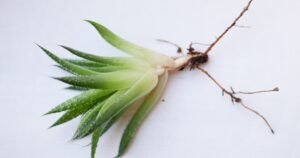Gardening can be a rewarding hobby, but it often comes with the challenge of dealing with persistent garden pests.
While chemical pesticides are effective, they can harm beneficial insects and have adverse environmental effects.
Here are some spices that ward off garden pests:
- Thyme
- Basil
- Mint
- Garlic
- Catnip
- Lavender
- Rosemary
There are natural and eco-friendly alternatives readily available: spices.
In this article, we will explore how various spices can be employed to repel garden pests and ensure the health of your plants.

Garlic
- Garlic, known for its culinary versatility, is also a powerful natural pest repellent.
- Planting garlic cloves near your garden can discourage soft-bodied insects such as aphids and slugs.
- The pungent odor of garlic confuses these pests, making it difficult for them to locate and infest your plants.

Thyme
- Thyme is a popular herb used in cooking and for its medicinal properties.
- It is native to the Mediterranean region and belongs to the mint family.
- There are over 350 different species of thyme, with different variations in taste and aroma.
- In cooking, thyme is often used as a seasoning for meats, vegetables, soups, stews, and sauces.

Basil
- Basil is another popular herb known for its strong aroma and flavor.
- It is native to Southeast Asia and belongs to the mint family.
- There are over 60 species of basil, with variations in taste, color, and appearance.
- In cooking, basil is commonly used in Italian cuisine for pasta sauces, pesto, and pizza.

Mint
- Mint is a versatile herb known for its refreshing and cooling properties.
- It is native to Europe, Asia, and Africa and belongs to the mint family.
- There are over 25 different species of mint, with varying levels of menthol content.
- In cooking, mint is often used in dishes such as salads, beverages, and desserts.
- It is also commonly used in herbal teas for its soothing and digestive properties.

Rosemary
- Rosemary is a fragrant herb with needle-like leaves native to the Mediterranean region.
- It belongs to the mint family, and there are over 20 different species of rosemary, each with its unique scent and flavor.
- In cooking, rosemary is often used as a seasoning for meats, vegetables, and potatoes.
- It is also commonly used in marinades, dressings, and sauces.

Catnip
- Catnip is a lesser-known herb that is native to Europe and Asia.
- It belongs to the mint family and is known for its calming effects on cats.
- However, it also benefits humans as it contains nepetalactone, which has been shown to repel mosquitoes and other insects.
- In gardening, catnip can be used as a natural pest repellent for plants.
- It can also be used in teas and as a seasoning for certain dishes.

Lavender
- Lavender is a fragrant herb that is native to the Mediterranean region.
- It belongs to the mint family and has been used for its medicinal and culinary properties for centuries.
- In gardening, lavender can be used as a natural insect repellent and attracts pollinators such as bees and butterflies.
- In cooking, it can be used in both sweet and savory dishes.

Cayenne Pepper
- Cayenne pepper, famous for its fiery flavor, possesses remarkable pest-repelling properties.
- Its intense heat is intolerable for various garden pests, including ants, caterpillars, and even squirrels.
- To create a barrier that pests are unlikely to cross, sprinkle cayenne pepper around your garden or directly onto vulnerable plants.
- Handling cayenne pepper with care is essential, as it can irritate the skin and eyes.
- Wearing gloves and avoiding contact with your face is advisable when working with them.

Cinnamon
- Cinnamon, celebrated for its sweet and spicy aroma, is equally effective in deterring garden pests like ants, aphids, and snails.
- You can scatter ground cinnamon around the base of your plants or concoct a cinnamon-infused water spray.
- The scent of cinnamon disrupts the pests’ communication and navigation systems, rendering them less capable of invading your garden.

Neem Oil
- Though not an excellent neem oil derived from the neem tree indigenous to India, it is widely recognized for its pest control properties.
- Neem oil contains azedarach, a natural insecticide that repels and disrupts various pests’ feeding and reproductive patterns, including aphids, mealybugs, and spider mites.
- Neem oil is readily available at garden centers and is a highly effective and eco-friendly solution for gardeners.

Peppermint
- Peppermint also serves as a potent pest repellent.
- Its strong scent masks the scent of your plants, making it challenging for pests such as rodents and aphids to locate and harm them.
- Planting peppermint around your garden or using peppermint oil in a spray can significantly reduce the likelihood of these pests invading your garden.
- Peppermint can deter larger pests like rabbits and deer.
Conclusion
What Spice Wards Off Garden Pests? Dealing with garden pests can be frustrating, but harsh chemicals are unnecessary. By incorporating spices like garlic, cayenne pepper, cinnamon and natural remedies like neem oil and peppermint, you can protect your garden in an environmentally friendly manner. In conclusion, various herbs can help ward off pests in the garden. Thyme, basil, mint, rosemary, garlic, and catnip have natural properties that effectively repel insects and other unwanted critters. Incorporating these herbs into your garden reduces the need for harmful chemicals and pesticides, making it a healthier and more environmentally friendly option. So, next time you plan your garden, consider adding some pest-repelling herbs to help keep unwanted visitors away.
FAQs
What are the most challenging garden pests to control?
Some of the toughest pests to manage include:
Japanese Beetles: These insects are notorious for their appetite and can cause extensive damage to various plants, making them challenging for gardeners.
Aphids: Aphids reproduce rapidly and can spread plant diseases, making them persistent and troublesome pests in gardens.
Cabbage Worms: These caterpillars have a knack for blending into leafy greens, making them hard to detect and eliminate, adding to the difficulty in keeping them in check in your garden.
What plant repels the most insects?
Marigolds are famous for their exceptional ability to repel insects, such as nematodes and aphids. Their potent fragrance and the natural compounds they emit are a natural deterrent, making marigolds one of the most effective insect-repelling plants for your garden.
Are these herbs safe to use in cooking?
Yes, all the herbs mentioned are safe to consume and commonly used in cooking.
Can these herbs be grown in a home garden?
Absolutely! These herbs can quickly be grown in a home garden with sunlight and water.
Are there any other benefits to using these herbs in the garden?
Yes, besides repelling pests, many herbs have medicinal properties and can attract pollinators to your garden.
So not only will they help with pest control, but they can also benefit your overall garden health. So it’s a win-win situation.
Can I use dried versions of these herbs for pest control?
While some of these herbs may still have some pest-repelling properties when dried, it is recommended to use fresh herbs for best results.
However, using dried herbs in cooking can still add flavor and other benefits.











